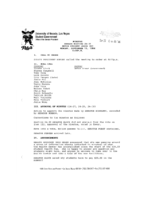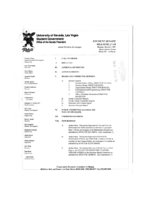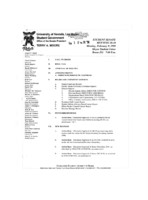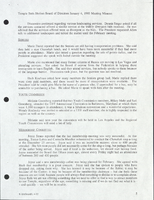Search the Special Collections and Archives Portal
Search Results
Chris Giunchigliani Political Papers
Identifier
Abstract
The Chris Giunchigliani Political Papers (1986-2019) document Giunchigliani's career as a member of the Nevada Assembly as well as her involvement as a Clark County Commissioner. The majority of the collection is a "newspaper and document archive" which consists of media articles and newspaper clippings collected by Giunchigliani's office that mention Giunchigliani throughout her political career. The collection also includes campaign materials such as mailers and photographs. Interviews Giunchigliani did with local news networks in Las Vegas, Nevada as well as televised campaign advertisements for the Clark County Commission election are represented in the collection. Other materials include legislative research files for bills on gypsum reclamation, development near Red Rock Canyon, education reform, and funding to build an NFL stadium in Las Vegas. The collection also includes a certificate of commendation from Senator Harry Reid and thank you cards from schoolchildren.
Archival Collection
E. W. Smith Glass Plate Negatives
Identifier
Abstract
The E. W. Smith Glass Plate Negatives (approximately 1900-1916) contain original glass plate negatives created by E. W. Smith during his time in Tonopah, Manhattan, Goldfield, and other central Nevada mining towns in the early 1900s. All photographs were taken by E. W. Smith unless noted otherwise in the inventory.
Archival Collection

Transcript of interview with Lilly Fong by Annie Yuk-Siu Shum, February 29, 1980
Date
Archival Collection
Description
Text

Transcript of interview with Sherwin "Scoop" Garside by David Anderson, March 25, 1976
Date
Archival Collection
Description
On March 25, 1976, David Anderson interviewed Sherwin “Scoop” Garside (born May 26, 1915 in Tonopah, Nevada) about his life in Southern Nevada. Garside first talks about his father’s business in running an early Nevada newspaper and his personal knowledge of the early mining that took place in different parts of Nevada. He also talks about living in the town of Tonopah, the American Indians who lived in the area, and his experiences from living in Las Vegas. Garside also mentions the beginnings of gambling in Las Vegas, the population boom periods of Las Vegas, and his experiences in witnessing the aboveground atomic testing.
Text

Meeting minutes for Consolidated Student Senate University of Nevada, Las Vegas, September 19, 1994
Date
Archival Collection
Description
Text

Meeting minutes for Consolidated Student Senate University of Nevada, Las Vegas, March 3, 1997
Date
Archival Collection
Description
Text

Meeting minutes for Consolidated Student Senate University of Nevada, Las Vegas, February 9, 1998
Date
Archival Collection
Description
Text

Interview with Jerome Alexander Zawada, August 9, 2006
Date
Archival Collection
Description
Text

Interview with Layton James O'Neill, July 23, 2004
Date
Archival Collection
Description
Text

Minutes from Temple Beth Sholom Board of Directors meetings, January 1993 - June 1993
Date
Archival Collection
Description
Meeting minutes include reports from committees of the board, correspondence, and balance sheets.
Text
